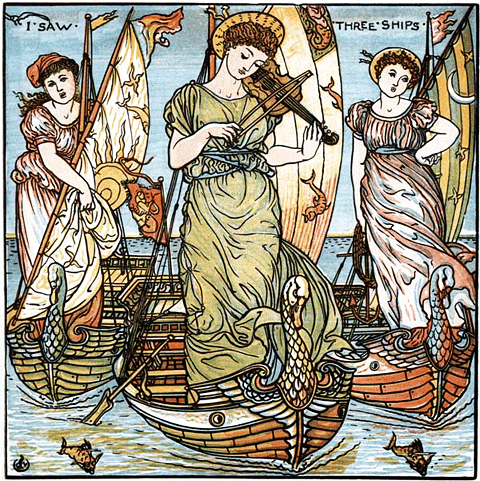 |
| "And Dick the shepherd blows his nail" by Edward Frederick Brewtnall |
When Isacles hang by the wall,
And Dicke the Sheepheard blowes his naile:And Thom beares Logges into the hall,And Milke coms frozen home in paile:When Blood is nipt, and wayes be full,Then nightly singes the staring OwleTu-whit to-who.A merrie note,While greasie Ione doth keele the pot.When all aloude the winde doth blow,And coffing drownes the Parsons saw;And Birdes sit brooding in the Snow,And Marrians nose lookes red and raw:When roasted Crabbs hisse in the bowle,Then nightly singes the staring Owle,Tu-whit to-who.A merrie note,While greasie Ione doth keele the pot.
Crabs are crab-apples, by the way. "Keel" means to stir to prevent boiling over. I don't recommend reciting this one out-of-doors in January. It's liable to make you even colder, cause ponds to freeze over, or give you a head cold. As long as the true identity of Shakespeare is in doubt, I might as well state that it's my belief that Shakespeare was from a dairy farm in Minnesota.
Respected English Professor assigned this as one of our memory works in lyric poetry class. This how we learned it more-or-less modern English:
Respected English Professor assigned this as one of our memory works in lyric poetry class. This how we learned it more-or-less modern English:
When icicles hang by the wallAnd Dick the shepherd blows his nail,And Tom bears logs into the hall,And milk comes frozen home in pail;When blood is nipped and ways be foul,Then nightly sings the staring owl:"Tu-who!"Tu-whit! Tu-who!" A merry note,While greasy Joan doth keel the pot.
When all aloud the wind doth blow,And coughing drowns the parson's saw,And birds sit brooding in the snow,And Marion's nose looks red and raw;When roasted crabs hiss in the bowl,Then nightly sings the staring owl:"Tu-who!"Tu-whit! Tu-who!" A merry note,While greasy Joan doth keel the pot.
 |
| Pieter Bruegel, "Hunters in the Snow" |



